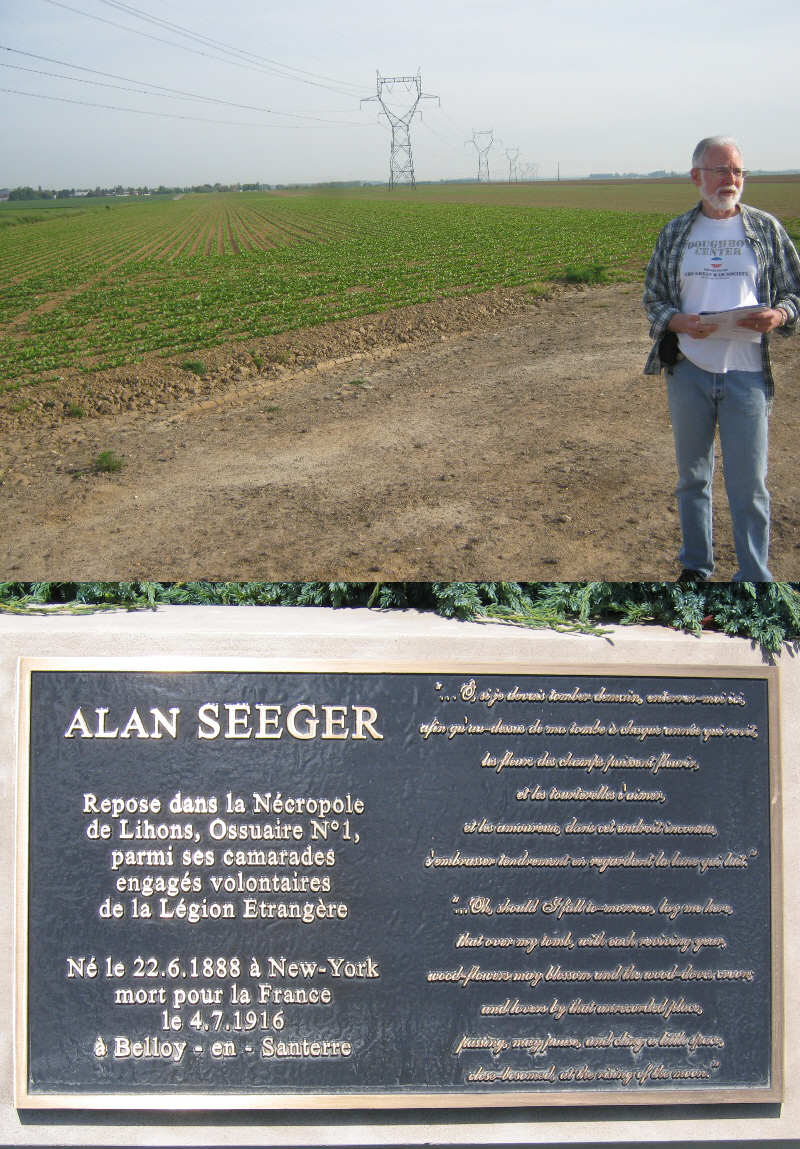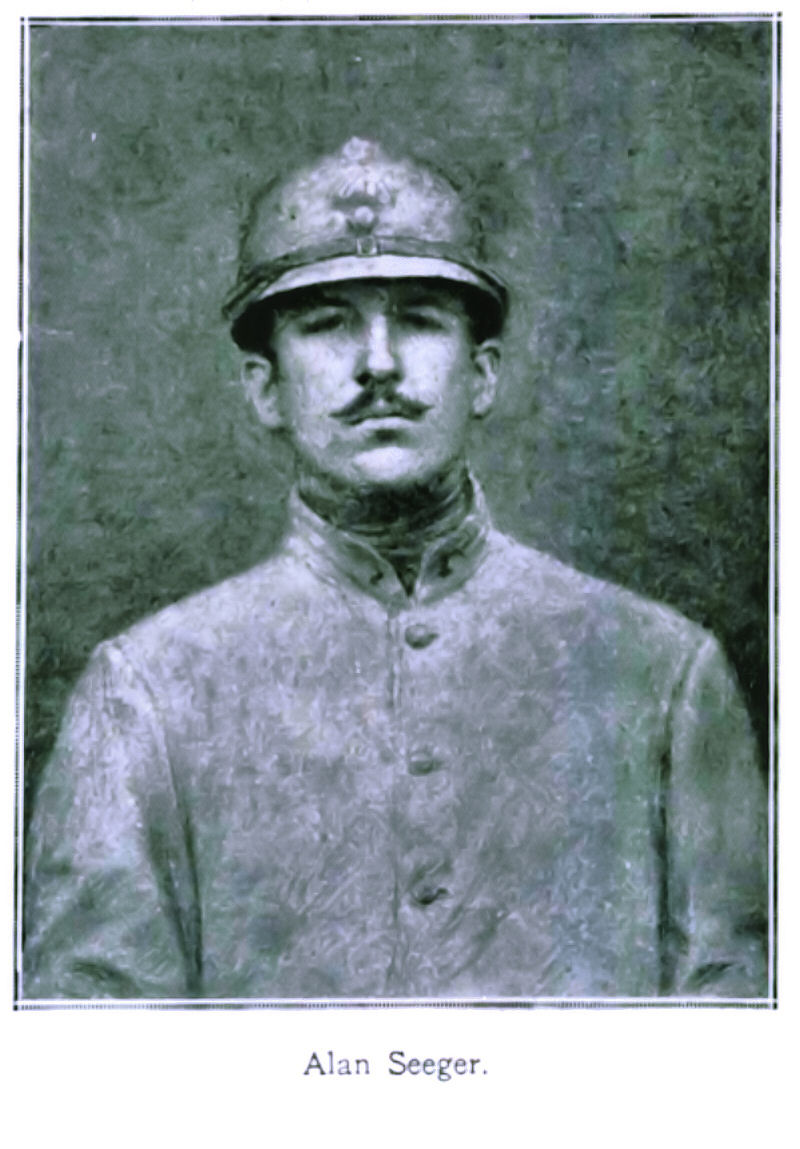We first presented this article on 4 July 2013, the 97th anniversary of the day the Foreign Legion attacked at Belloy-en-Santerre during the Battle of the Somme. The attack was mounted from left to right over the field shown below. The village is just to the right of the image. An American Legionnaire was among those who fell that day.
Click on Image to Expand
At Belloy-en-Santerre
Above (top image), friend and traveling mate Mark Fowler of San Antonio, Texas, reads "Rendezvous" at the field where Alan Seeger fell during the Battle of the Somme. Below Mark is the plaque in the village of Belloy-en-Santerre honoring Seeger and identifying his burial site.
Click on Image to Expand
Alan Seeger was born in New York in 1888. Encouraged by his family, he was attracted to literature at an early age, especially poetry, and was an enthusiastic contributor to the in-house magazine his family enjoyed producing. His wealthy family sent him to private school and then to Harvard College, where he was particularly interested in Celtic literature and edited and wrote poetry for the Harvard Monthly.
His parents were dismayed when, after graduating from Harvard, he moved to Greenwich Village, where he lived a bohemian life. They sent him to Paris in 1912 to study at the Sorbonne, but this further encouraged his eccentric lifestyle and intensified his love of poetry. He also became interested in politics and wrote several sonnets and other poems on the events of the day that were leading up to the Great War. Although he was visiting London when war was declared, he at once rushed back to Paris and enlisted with some 40 other Americans in the French Foreign Legion. The training was demanding, but he appears to have been happy and proud to be fighting for a country he had come to love. His poems and letters home were now taking on a more fatalistic theme and also expressed the classical sentiment that death for a good soldier could be a beautiful and noble thing.
Seeger was soon to see action with the 2nd Foreign Regiment, action which gave him experience and also material for his poetry. "The Aisne (1914-1915)" describes his first experience of battle along the Chemin des Dames. By September 1915 he was in the thick of the Battle of Champagne, which he vividly described in his letters home. There, after seeing grape pickers busy not far from the fighting, he wrote a long poem in which he appealed to wine drinkers to "Drink sometimes…to those whose blood, in pious duty shed/Hallows the soil where that same wine had birth" (Champagne 1914-1915).
His parents were dismayed when, after graduating from Harvard, he moved to Greenwich Village, where he lived a bohemian life. They sent him to Paris in 1912 to study at the Sorbonne, but this further encouraged his eccentric lifestyle and intensified his love of poetry. He also became interested in politics and wrote several sonnets and other poems on the events of the day that were leading up to the Great War. Although he was visiting London when war was declared, he at once rushed back to Paris and enlisted with some 40 other Americans in the French Foreign Legion. The training was demanding, but he appears to have been happy and proud to be fighting for a country he had come to love. His poems and letters home were now taking on a more fatalistic theme and also expressed the classical sentiment that death for a good soldier could be a beautiful and noble thing.
Seeger was soon to see action with the 2nd Foreign Regiment, action which gave him experience and also material for his poetry. "The Aisne (1914-1915)" describes his first experience of battle along the Chemin des Dames. By September 1915 he was in the thick of the Battle of Champagne, which he vividly described in his letters home. There, after seeing grape pickers busy not far from the fighting, he wrote a long poem in which he appealed to wine drinkers to "Drink sometimes…to those whose blood, in pious duty shed/Hallows the soil where that same wine had birth" (Champagne 1914-1915).
| Romantic poet, dedicated diarist, and warrior, all of Seeger's writings in one volume. | Order Now |
After a spell of sick leave and recuperation for bronchitis he returned to the front. He was scarcely inactive; according to one biographer, "He delighted in sneaking off on solitary scouting excursions, bringing back scraps of German newspapers and leaving his visiting card on the German wire…he longed for the Croix de Guerre."
When the blood baths of Verdun and then the Somme developed, Seeger longed to be in the thick of things, and at this time he wrote what is considered by many to be the best American poem of WWI — "I Have a Rendezvous with Death."
When the blood baths of Verdun and then the Somme developed, Seeger longed to be in the thick of things, and at this time he wrote what is considered by many to be the best American poem of WWI — "I Have a Rendezvous with Death."
|
I have a rendezvous with Death At some disputed barricade, When Spring comes back with rustling shade And apple-blossoms fill the air— I have a rendezvous with Death When Spring brings back blue days and fair. It may be he shall take my hand And lead me into his dark land And close my eyes and quench my breath— It may be I shall pass him still. I have a rendezvous with Death On some scarred slope of battered hill, When Spring comes round again this year And the first meadow-flowers appear. God knows 'twere better to be deep Pillowed in silk and scented down, Where love throbs out in blissful sleep, Pulse nigh to pulse, and breath to breath, Where hushed awakenings are dear... But I've a rendezvous with Death At midnight in some flaming town, When Spring trips north again this year, And I to my pledged word am true, I shall not fail that rendezvous. |
Few poems have been so fatalistic and at the same time cruelly prophetic. On 4 July 1916 Seeger's section was ordered to take the village of Belloy-en-Santerre. As he charged forward, German machine guns opened up from a nearby hollow, and Legionnaire Seeger made his rendezvous.



San Antonio, that is, and it was an honor and a privilege - thanks, Mike.
ReplyDeleteMy apologies, Mark. Two tours of training at Lackland AFB has distorted my mental map of Texas. Say hi to S. for me.
DeleteMike
gashed w honorable scars,
ReplyDeletelow in glory's lap they lie,
though they fell like stars,
streaming splendor through the skies.
James Montgomery 1771-1854
From poem about a Bullet: "...My name is Death, and I travel unknowing..."
ReplyDeleteSeeger lived too late. He should have lived at the time of the Greeks and Romans, or at least no later than Agincourt. Still, he achieved his goals of a glorious death and immortality. Not bad in these times.
ReplyDelete